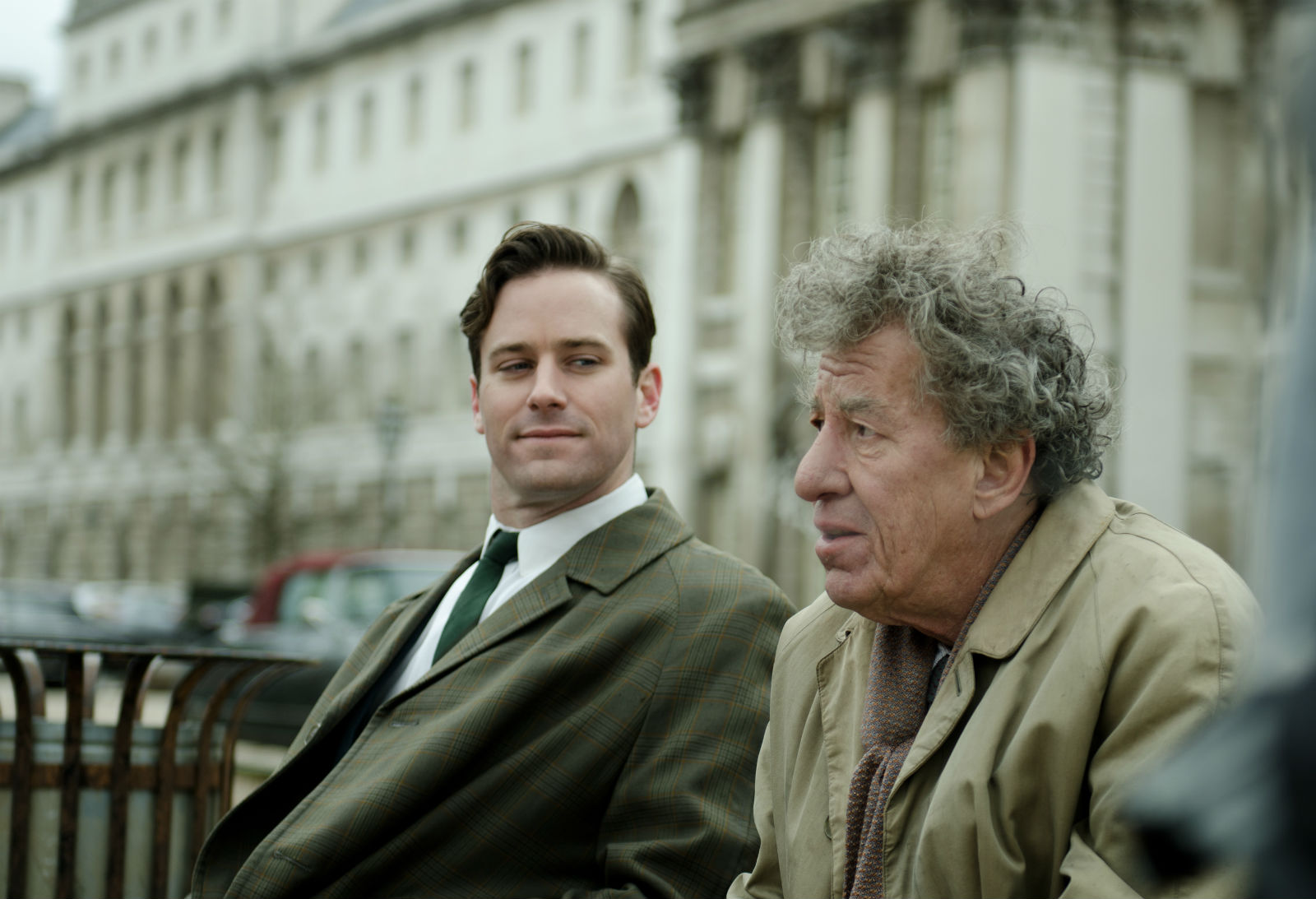Final Portrait: Stanley Tucci's Homage to Giacometti Stops Short of Insight
By Liam Lacey
Rating: B
If you recall the wonderful omelette-cooking scene at the end of Stanley Tucci's restaurant comedy Big Night, or his film The Imposters or Joe Gould's Secret, you know the actor-director's fascination with the ups and downs of artistic struggle.
That's the theme of his drama Final Portrait, a breezy character study of the volatile artist, Alberto Giacometti (Geoffrey Rush). It’s based on a memoir by writer James Lord (Armie Hammer), who sat for a portrait by the artist, in 1964. Shot mainly on a London set, Final Portrait recreates the messy shed that served as Giacometti's Paris studio ("a seething dump," according to Jean Genet), which seems to have been correlative to his mental state.
Armie Hammer and Geoffrey Rush: life stranger than fiction...
The timing is good: Giacometti's sculptures of anguished, spindly human figures have enjoyed a boom in value in the past decade, commanding upwards of $100 million. There was a major retrospective of Giacometti's sculpture at the Tate Modern in 2015, and an exhibition of his paintings at the National Portrait Gallery in 2015. (Quebec City's Musée national des beaux-arts du Québec is currently showing an exhibition of his sculptures until May). In the artist’s later years, in the early 1960s, he turned to obsessively reworked monochromatic portraits.
Tucci's film is adapted from a short book Lodge wrote about his experience, of how an afternoon sketch session extended into an 18-day posing marathon, as he experienced the artist's process and day-to-day life.
Unavoidably, we have a movie that involves a lot of sitting — as well as talking, and smoking, with the occasional relief of a walk through a cemetery or drinks at a cafe. The movie begins in that Woody Allen-ish, whimsical faux-European style (white credits on a black screen, accordion music) before giving way to a greyer and grittier world of the artist's studio. The somewhat overexcited camera work seems designed to suggest Giacometti's agitated inner life, as much as to avoid stasis.
Rush, chain-smoking, wearing a wig of greying curls and dressed in rumpled suits, looks enough like Giacometti. And he offers a whirlwind of a performance with enough cracks of vulnerability to avoid being over-bearing.
Giacometti's mood swings and mad pronouncements are jarring. He explains to Lord that he used to put himself to sleep, not by counting sheep like ordinary insomniacs, but by imagining raping and killing women. Also, he trash-talks Picasso, which is fun as opposed to deranged.
We also have a small but poignant impression of his long-suffering wife, Annette (Sylvie Testud) who retreats to an attic bedroom when Alberto entertains his favourite prostitute and sometime-muse, the giggly Caroline (Clémence Poésy).
The living conditions are squalid, though money — hidden in bundles around the house — is not a problem. Periodically, the artist's cagey, brother Diego (Tony Shaloub) pops in, bringing art supplies or cases full of cash from the art dealer (Alberto does not believe in banks).
At one point, Alberto presents Caroline with a shiny new convertible. When her opportunistic pimps trash his studio, demanding payment for services rendered, the unfazed Giacometti meets them for a lunch, and hands over several wads of cash for time owing, and future benefits.
While the contrast between the unconventional Giacometti and Lord, as his buttoned-down Boswell, is mildly amusing, Hammer's characterization is excessively stiff. Proper in his formal blazer, tie and dress shirt, stuck on his stool, he’s a passive observer to a fault. Typically, he offers little more than a furrowed brow and pursed expression of concern at the genius's shenanigans.
The real Lord, who was in his 40s and had known the artist for a dozen years before the sitting, was more worldly than the film suggests. His posthumously published memoir, My Queer War, recalls his experiences as a gay soldier during the Second World War ("...my comrades-in-arms were as eager as I to sleep in the arms of their comrades"). There's only so much drama that can be wrung from Lord's frustration at having to repeatedly re-book his flight home, as Giacometti, paints over each previous day's work.
Tucci seems content to focus on the conventional, the artist's self-doubt and obsessiveness, without addressing the question of what Giacometti saw in Lord or what he was searching for. Why is such a portrait, which sold for more than $20-million, artistically significant?
I checked this out with the Giacometti Foundation, the Paris-based institute which oversees the artist's legacy, his portraits "are the translation of the model as an implacable otherness, which can never be grasped in its entirety. These portraits, devoid of all emotion and expression, are the receptacle of what the spectator brings to them."
Now that's clear as paint. Either Final Portrait slips across the surface of its subject or I'm just not bringing enough to the receptacle.
Final Portrait. Directed and written by Stanley Tucci, based on James Lord’s memoir, A Giacometti Portrait. Starring Geoffrey Rush, Armie Hammer, Tony Shalhoub, Sylvie Testud and Clémence Poésy. Opens April 6 in Toronto and Vancouver, April 20 in Montreal, and throughout the spring in other cities.

